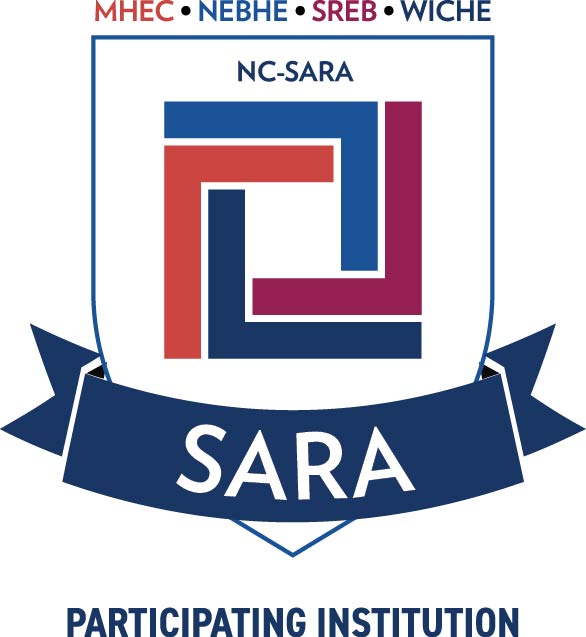State Authorization Reciprocity Agreement
Merrimack College is an institutional participant in the State Authorization Reciprocity Agreement (SARA) (from December 3, 2018).
“The State Authorization Reciprocity Agreements, commonly known as SARA, provides a voluntary, regional approach to state oversight of postsecondary distance education. When states join SARA, they agree to follow uniform processes for approving their eligible institutions’ participation. They also agree to deal with other states’ SARA institutions in a common way when those institutions carry out activities in SARA states other than their own.
SARA’s policies help protect students and provide benefits to both states and institutions carrying out distance education in multiple states. As of April 2020, 49 states, the District of Columbia, Puerto Rico and the U.S. Virgin Islands are members of SARA. Over 2,100 colleges and universities participate in SARA.”
Source: National Council for State Authorization Reciprocity Agreements (NC-SARA)

Process for Resolving Complaints
Step 1: Attempt to Resolve Complaint Within Merrimack College
Online students residing in a SARA state should attempt to resolve student complaints internally using policies and procedures outlined in Merrimack College’s current online Undergraduate Catalog for undergraduate students and online Graduate Catalog for graduate students. Merrimack College will make every attempt to resolve student complaints within its academic and administrative departments. It is expected that students will fully utilize all such administrative procedures to address concerns and/or complaints in a timely manner. The institutional complaint process for distance learning students is the same for all students regardless of physical location.
Contact Information for Assistance
For help in resolving a student complaint or for questions about the student complaint and grievance process for online programs at Merrimack College, please contact:
Jonathan Lyon, Executive Vice Provost
Office of the Provost – Merrimack College
Mail: 315 Turnpike Street, North Andover, MA 01845
Email: officeoftheprovost@merrimack.edu (include “online program” in the subject line)
Phone: 978-837-5280
Please use the Student Complaint Form to provide information regarding complaints.
Helpful Resources for Students
- Academic Requirements and Policies (for undergraduate students)
- Academic Grade Appeals, Academic Honesty Violations, etc.
- Academic Requirements and Policies (for graduate students)
- Academic Grade Appeals, Academic Honesty Violations, etc.
- Non-Academic Complaints
- Office of Community Standards: Expectations & Process
- Criminal Activity
- Merrimack College Police Department (978-837-5911)
- Community Standards
- Violation of the Law and and College Discipline
If an issue regarding distance education cannot be resolved internally, please see the process below.
Step 2: If Complaint Not Resolved at Institutional Level, Your Next Step Depends on Your Residency
Out-of-State Students
If your complaint is not resolved at the institutional level, then out-of-state students residing in NC-SARA (National Council for State Authorization Reciprocity Agreement) states, which includes all states except California, may submit complaints to the Massachusetts Department of Higher Education through the SARA Student Complaint form. Access the Complaint Form
Further information can be obtained through the following contact information:
Massachusetts Department of Higher Education
Mail: One Ashburton Place, Room 1401, Boston, MA 02108
Email: SARAInquiries@dhe.mass.edu
Phone: 617-994-6910
State SARA Website: www.mass.edu/sara
Massachusetts and Non-SARA Member States or Territories (California, Guam, etc.) Residents:
If your complaint is not resolved at the institutional level, then you may refer your complaint to the Massachusetts Department of Higher Education through its complaint form. Further information can be obtained through the Massachusetts Department of Higher Education’s legal office at 617-994-6963.
Should an issue need further support, it will be referred to the Consumer Protection Division of the Massachusetts Consumer Protection Division and/or the Public Charities Division of the Attorney General’s Office. The Consumer Hotline for the Attorney General’s Consumer Advocacy & Response Division can be reached at 617-727-8400.
State Portal Entity Contacts. NC-SARA provides a complete list of relevant agencies with contact information for each NC-SARA state.
National Council for State Authorization Reciprocity
Mail: 3005 Center Green Drive, Suite 130, Boulder, Colorado 80301
Email: info@nc-sara.org
Phone: 303-848-3275
Contact: http://nc-sara.org/content/contacts
Professional Licensure Disclosure Information
Professional licensure and certification regulations vary from state to state, and Merrimack College’s academic programs may not necessarily prepare students to meet the requirements for licensure and/or certification in every state. Prospective students who reside outside of the state of Massachusetts and who are interested in any online Merrimack College academic program which may lead to professional licensure are expected to inquire with the appropriate licensing agency in their home state, prior to beginning the program in order to assure that the program is approved to provide the desired licensure.
The following programs offered by Merrimack College customarily lead to a professional license. An indication is provided below regarding whether the program meets a state’s requirements, does not meet a state’s requirements, or if Merrimack College has not yet made a determination whether such program meets a state’s requirements. For programs in which Merrimack College has not yet made a determination whether such program meets a state’s requirements, please contact the agencies listed below and be advised that you should determine whether the program will meet your state’s requirements prior to enrolling in such program.
MS in Accounting
For the MS in Accounting program, the College has determined that the program meets licensure requirements within the states of Connecticut, Georgia, Massachusetts, Minnesota, Nevada, New Hampshire, New Jersey, New York, North Carolina, and Rhode Island. It does not meet licensure requirements within the states of California, Florida, Texas, and Washington. Merrimack College has not yet made a determination whether this program meets the state’s requirements for the other 35 states or the District of Columbia.
For further information regarding requirements within the state you are seeking licensure, please see the NASBA Boards of Accountancy.
MS in Clinical Mental Health Counseling
For the MS in Clinical Mental Health Counseling program, the College has determined that the program meets licensure requirements within the states of Connecticut, Georgia, Massachusetts, Michigan, New Hampshire, New Jersey, South Carolina, Vermont, and Washington. It does not meet licensure requirements within the states of California, Florida, Kentucky, Maryland, Minnesota, North Carolina, Ohio, Rhode Island, and Texas. Merrimack College has not yet made a determination whether this program meets the state’s requirements for the other 32 states or the District of Columbia.
For further information regarding requirements within the state you are seeking licensure, please see the American Counseling Association.
M.Ed. in Teacher Education
For the M.Ed. in Teacher Education, the College has determined that the program meets licensure requirements within the states of Alabama, Alaska, Arizona, Arkansas, Colorado, Connecticut, Delaware, the District of Columbia, Florida, Georgia, Hawaii, Idaho, Illinois, Indiana, Kansas, Louisiana, Maine, Maryland, Massachusetts, Michigan, Minnesota, Mississippi, Missouri, Montana, Nebraska, Nevada, New Hampshire, New Mexico, New York, North Carolina, North Dakota, Ohio, Oklahoma, Oregon, Rhode Island, South Carolina, South Dakota, Tennessee, Texas, Utah, Vermont, Washington, West Virginia, Wisconsin, and Wyoming. The College has determined that the program does not meet licensure requirements within the states of California, Iowa, Kentucky, New Jersey, Pennsylvania, and Virginia.
For further information regarding requirements within the state you are seeking licensure, please see the state contact list provided by NC-SARA.
Additional resources: US Department of Education: State Contacts and the Massachusetts Department of Elementary and Secondary Education.
Add-On License in Early Childhood Education, Add-On License in English as a Second Language, and Add-On License in Moderate Disabilities
For the Add-On License in Early Childhood Education, the Add-On License in English as a Second Language, and the Add-On License in Moderate Disabilities, the College has determined that the Add-On Licenses meet licensure requirements within the states of Alabama, Alaska, Arizona, Arkansas, Colorado, Connecticut, Delaware, the District of Columbia, Florida, Georgia, Hawaii, Idaho, Illinois, Indiana, Kansas, Louisiana, Maine, Maryland, Massachusetts, Michigan, Minnesota, Mississippi, Missouri, Montana, Nebraska, Nevada, New Hampshire, New Mexico, New York, North Carolina, North Dakota, Ohio, Oklahoma, Oregon, Rhode Island, South Carolina, South Dakota, Tennessee, Texas, Utah, Vermont, Washington, West Virginia, Wisconsin, and Wyoming. The College has determined that the Add-On Licenses do not meet licensure requirements within the states of California, Iowa, Kentucky, New Jersey, Pennsylvania, and Virginia.
For further information regarding requirements within the state you are seeking licensure, please see the state contact list provided by NC-SARA.
Additional resources: US Department of Education: State Contacts and the Massachusetts Department of Elementary and Secondary Education.

